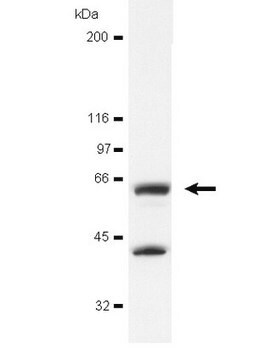05-184
Anti-Src Antibody, clone GD11
clone GD11, Upstate®, from mouse
Synonym(s):
Anti-ASV, Anti-SRC1, Anti-THC6, Anti-c-SRC, Anti-p60-Src
About This Item
Recommended Products
biological source
mouse
antibody form
purified immunoglobulin
antibody product type
primary antibodies
clone
GD11, monoclonal
species reactivity
avian, mink, mouse, rat, human
manufacturer/tradename
Upstate®
technique(s)
immunoprecipitation (IP): suitable
western blot: suitable
isotype
IgG1
NCBI accession no.
UniProt accession no.
shipped in
dry ice
target post-translational modification
unmodified
Gene Information
human ... SRC(6714)
General description
Some tumor-inducing retroviruses (such as Rous sarcoma virus (RSV)), contain a gene called v-src (viral-sarcoma). It was found that the v-src gene in RSV is required for the formation of cancer.
Src tyrosine kinases transmit integrin-dependent signals central to cell movement and proliferation. Hallmarks of v-src induced transformation are rounding of the cell and the formation of actin rich podosomes on the basal surface of the cell. These structures are correlated with increased invasiveness, a process thought to be essential for metastasis.
v-src lacks the C-terminal inhibitory phosphorylation site, and is therefore constitutively active as opposed to normal src (c-src) which is only activated under certain circumstances where it is required (e.g. growth factor signaling). v-src is therefore an instructive example of an oncogene whereas c-src is a proto-oncogene.
Specificity
Immunogen
Application
Signaling
Cytoskeletal Signaling
Quality
Target description
Physical form
Storage and Stability
Analysis Note
Positive Control Included: Non-Stim A431 Cell Lysate (12-301). Chicken Embryo Fibroblast (CEF) cells expressing Src protein and plated on fibronectin or Non-stimulated human A431 cell lysate
Legal Information
Disclaimer
Not finding the right product?
Try our Product Selector Tool.
Storage Class Code
10 - Combustible liquids
WGK
WGK 2
Certificates of Analysis (COA)
Search for Certificates of Analysis (COA) by entering the products Lot/Batch Number. Lot and Batch Numbers can be found on a product’s label following the words ‘Lot’ or ‘Batch’.
Already Own This Product?
Find documentation for the products that you have recently purchased in the Document Library.
Our team of scientists has experience in all areas of research including Life Science, Material Science, Chemical Synthesis, Chromatography, Analytical and many others.
Contact Technical Service







